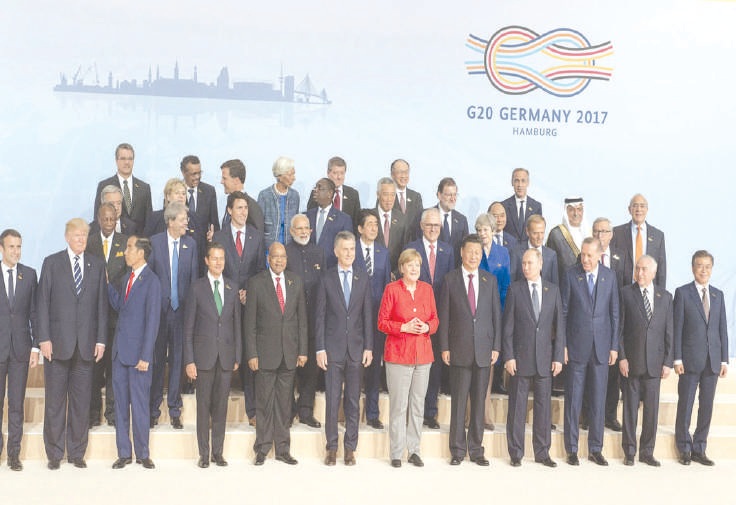By : Amira Elhamy
Hamburg hosted on the 7th and 8th of July the G20 summit, with the presence of more than 20 heads of state and governments as well as representatives of various international organisations. The Group of twenty is comprised of 19 countries plus the European Union. These countries have come to be known as G20 and include the following countries:Argentina, Australia, Brazil, Canada, China, France, Germany, India, Indonesia, Italy, Japan, Mexico, Russia, Saudi Arabia, South Africa, South Korea, Turkey, the United Kingdom and the United States of America. G20 2017 dealt with major issues, trade was one of the most significant topics. According to G20.org, Angela Merkel reported that there had been extremely intensive discussions on trade; summit participants agreed to fight protectionism and unfair trade practices. The rules-based international trading system, as embodied by the World Trade Organisation (WTO), plays a vital role in this. Bilateral agreements, must always be WTOcompliant, said the Chancellor. The Global financial system, women empowerment, and responsibility towards Africa were also key issues that were discussed. During the summit Angela Merkel talked about ensuring stability in the international financial system. She pointed to the Hamburg Action Plan; which was also adopted at the summit. The Leaders’ Declaration stipulates, "We will promote greater inclusiveness, fairness and equality in our pursuit of economic growth and job creation. To these ends, we endorse the Hamburg Action Plan." As for women empowerment, Merkel mentioned the initiative "#eSkills4Girls" which aims "to promote opportunities and equal participation for women and girls in the digital economy in developing countries in particular;” as the Leaders’ Declaration says. “Accepting responsibility”, was the motto that G20, 2017 raised related to African issues and the challenges that the black continent need to address. “We launch the G20 Africa Partnership in recognition of the opportunities and challenges in African countries as well as the goals of the 2030 Agenda,” said the Chancellor. The summit participants also declared that education is a "central factor" and "the key to sustainable growth" on Europe’s neighboring continent. The US withdrawal from Paris Climate Agreement could never have passed in silence during G20, 2017. All participants regretted the US decision. As for Chancellor Merkel, she said that she is satisfied that all other G20 members agreed that the Paris Agreement is simply irreversible. According to CNN, the G20 declaration noted the US withdrawal from the accord but said the country affirmed its "strong commitment to an approach that lowers emissions while supporting economic growth and improving energy security needs." Regarding the Russian situation related to climate change, following the summit, Russian President Vladimir Putin called climate change a "major issue" and said Merkel had reached a "good compromise." As for British Prime Minister Theresa May, she said that she was dismayed at the US climate stance and that she had urged Trump to reconsider. Justin Trudeau, Canadian Prime Minister said during the G20 that strong economic growth and environmental protection can go hand in hand. He noted that "This is the narrative that we have been sharing … and was enthusiastically supported by just about everyone here at the G20.” It is to be noted that the G20 is the central forum for international cooperation on financial and economic issues. The G20 countries account for more than four-fifths of gross world product and three-quarters of global trade, and are home to almost two-thirds of the world’s population. According to “G20.org” the G20 heads of state and government traditionally focus on issues relating to global economic growth, international trade and financial market regulation. The G20 finance ministers and central bank governors began meeting regularly in 1999. Other issues of global significance are often closely linked with economic questions. Examples include climate change, development policy, labour market and employment policy, the spread of digital technology and, topically, counter-terrorism. The range of issues now considered by the G20 thus makes for a broad agenda. Since the global financial crisis, the G20 states have been working to strengthen the resilience of the global financial system and to improve the regulation and supervision of financial market participants, including what is known as the shadow banking system. The aim is to ensure that no financial market, financial market participant or financial product remains unsupervised. Furthermore, G20 countries account for three quarters of global trade. China, the United States, Germany and Japan are the four largest exporting countries in the world. Of the 20 countries with the largest volume of exports worldwide, 15 are members of the G20; thus, they constantly take in consideration how to achieve a strong, sustainable and balanced global economic growth.


